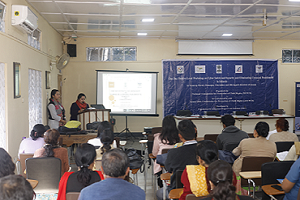
Children and young people have shown greater ability to adapt and to adopt digital devices and innovations, which augurs well for the future. The internet has enabled children to become active social agents and to mobilize for social, ecological and other causes. Ministry of Home Affairs has approved a scheme namely ‘Cyber Crime Prevention against Women and Children (CCPWC)’ under which an online Cyber Crime reporting portal, (www.cybercrime.gov.in) has been launched to enable public to report complaints pertaining to Child Pornography/ Child Sexual Abuse Material, rape/gang rape imageries or sexually explicit content. The most common means of maintaining discipline in schools was corporal punishment. Meting corporal punishment to any child is deemed illegal and is a crime which invites sanctions and punishment against the perpetrator. The National Commission for Protection of Child Rights (NCPCR) under the Commissions for Protection of Child Rights (CPCR) Act, 2005, an Act of Parliament (December 2005) under the administrative control of the Ministry of Women & Child Development,Government of India, visualizes a rights-based perspective flowing into National Policies and Programmes, along with nuanced responses at the State, District and Block levels, taking care of specificity and strengths of each region.

Children and young people have shown greater ability to adapt and to adopt digital devices and innovations, which augurs well for the future. The internet has enabled children to become active social agents and to mobilize for social, ecological and other causes. Ministry of Home Affairs has approved a scheme namely ‘Cyber Crime Prevention against Women and Children (CCPWC)’ under which an online Cyber Crime reporting portal, (www.cybercrime.gov.in) has been launched to enable public to report complaints pertaining to Child Pornography/ Child Sexual Abuse Material, rape/gang rape imageries or sexually explicit content. The most common means of maintaining discipline in schools was corporal punishment. Meting corporal punishment to any child is deemed illegal and is a crime which invites sanctions and punishment against the perpetrator. The National Commission for Protection of Child Rights (NCPCR) under the Commissions for Protection of Child Rights (CPCR) Act, 2005, an Act of Parliament (December 2005) under the administrative control of the Ministry of Women & Child Development,Government of India, visualizes a rights-based perspective flowing into National Policies and Programmes, along with nuanced responses at the State, District and Block levels, taking care of specificity and strengths of each region.

Children and young people have shown greater ability to adapt and to adopt digital devices and innovations, which augurs well for the future. The internet has enabled children to become active social agents and to mobilize for social, ecological and other causes. Ministry of Home Affairs has approved a scheme namely ‘Cyber Crime Prevention against Women and Children (CCPWC)’ under which an online Cyber Crime reporting portal, (www.cybercrime.gov.in) has been launched to enable public to report complaints pertaining to Child Pornography/ Child Sexual Abuse Material, rape/gang rape imageries or sexually explicit content. The most common means of maintaining discipline in schools was corporal punishment. Meting corporal punishment to any child is deemed illegal and is a crime which invites sanctions and punishment against the perpetrator. The National Commission for Protection of Child Rights (NCPCR) under the Commissions for Protection of Child Rights (CPCR) Act, 2005, an Act of Parliament (December 2005) under the administrative control of the Ministry of Women & Child Development,Government of India, visualizes a rights-based perspective flowing into National Policies and Programmes, along with nuanced responses at the State, District and Block levels, taking care of specificity and strengths of each region.

Children and young people have shown greater ability to adapt and to adopt digital devices and innovations, which augurs well for the future. The internet has enabled children to become active social agents and to mobilize for social, ecological and other causes. Ministry of Home Affairs has approved a scheme namely ‘Cyber Crime Prevention against Women and Children (CCPWC)’ under which an online Cyber Crime reporting portal, (www.cybercrime.gov.in) has been launched to enable public to report complaints pertaining to Child Pornography/ Child Sexual Abuse Material, rape/gang rape imageries or sexually explicit content. The most common means of maintaining discipline in schools was corporal punishment. Meting corporal punishment to any child is deemed illegal and is a crime which invites sanctions and punishment against the perpetrator. The National Commission for Protection of Child Rights (NCPCR) under the Commissions for Protection of Child Rights (CPCR) Act, 2005, an Act of Parliament (December 2005) under the administrative control of the Ministry of Women & Child Development,Government of India, visualizes a rights-based perspective flowing into National Policies and Programmes, along with nuanced responses at the State, District and Block levels, taking care of specificity and strengths of each region.

Children and young people have shown greater ability to adapt and to adopt digital devices and innovations, which augurs well for the future. The internet has enabled children to become active social agents and to mobilize for social, ecological and other causes. Ministry of Home Affairs has approved a scheme namely ‘Cyber Crime Prevention against Women and Children (CCPWC)’ under which an online Cyber Crime reporting portal, (www.cybercrime.gov.in) has been launched to enable public to report complaints pertaining to Child Pornography/ Child Sexual Abuse Material, rape/gang rape imageries or sexually explicit content. The most common means of maintaining discipline in schools was corporal punishment. Meting corporal punishment to any child is deemed illegal and is a crime which invites sanctions and punishment against the perpetrator. The National Commission for Protection of Child Rights (NCPCR) under the Commissions for Protection of Child Rights (CPCR) Act, 2005, an Act of Parliament (December 2005) under the administrative control of the Ministry of Women & Child Development,Government of India, visualizes a rights-based perspective flowing into National Policies and Programmes, along with nuanced responses at the State, District and Block levels, taking care of specificity and strengths of each region.